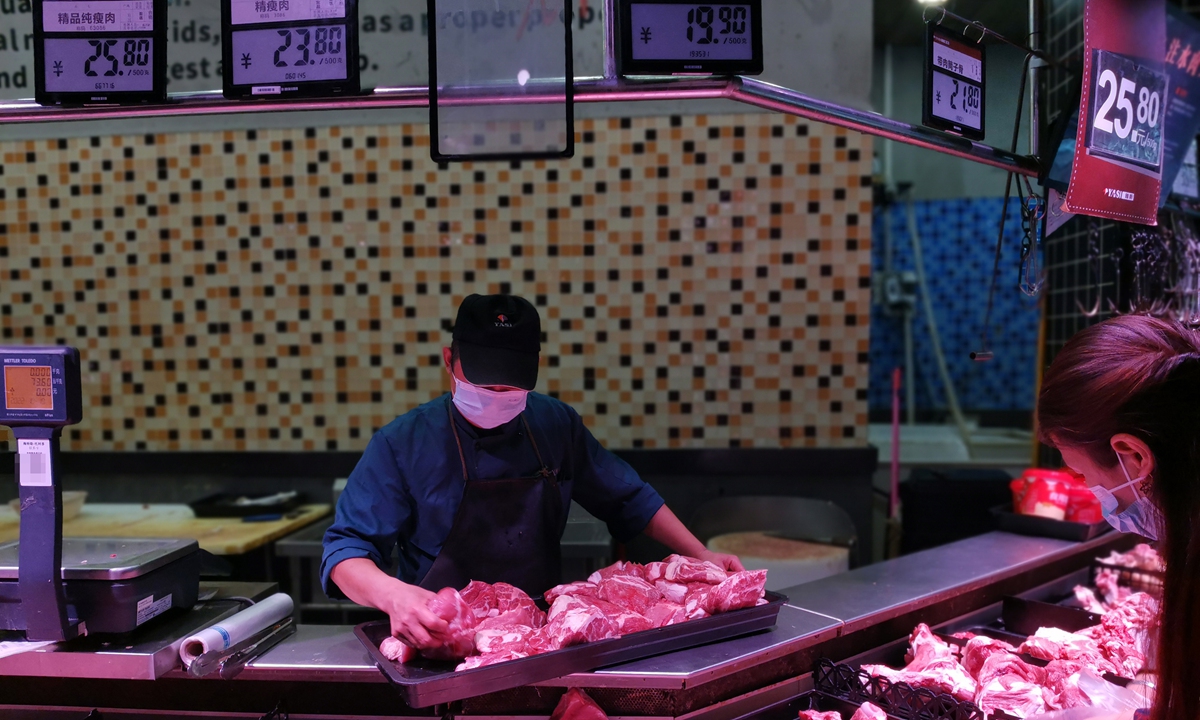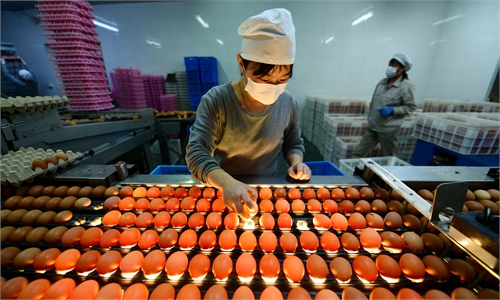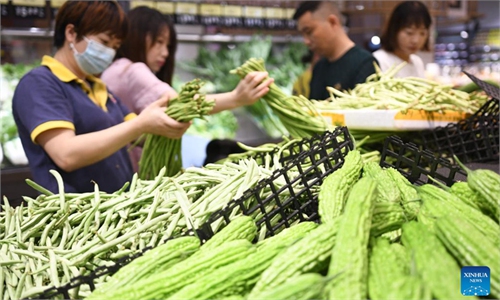
A worker puts out pork for sale at a supermarket in Yichang, Central China's Hubei Province on October 19, 2022. As pork prices are surging, China will release the sixth batch of central pork reserves this year to ensure stable pork supply, Xinhua reported on October 19. Photo: VCG
China has not seen deflation in its economy, and it is unlikely to suffer from deflation in the near future, the National Bureau of Statistics (NBS) said on Monday.
Recently, there are discussions on whether the world's second largest economy has slipped into deflation as the country's consumer price index (CPI) has been running lower than expected in the past two months.
Consumer prices are at the low ebb in the current phase, but China's economy has "no conditions to fall into deflation", particularly if the economic indicators such as economic growth rate and gross money supply are taken into account, Fu Linghui, a spokesperson for the National Bureau of Statistics (NBS), told a press conference on Monday.
China's GDP expanded by an impressive 5.5 percent in the first half on a yearly basis, much higher than other major economies in the world, Fu said, as the economy continues to recover momentum amid mounting global headwinds, frustrating those anticipating otherwise.
The economy is expected to continue to gain pace in the second half this year, and the previously set annual GDP growth target of around 5 percent is within reach, analysts said.
"From the perspective of price itself, the world economy lacks sustained recovery momentum in the first half and energy prices have fallen, driving down domestic energy prices. Meanwhile, domestic automakers' concentrated promotional campaign on prices, plunging pork prices, coupled with the high comparison base last year, have led to the lower CPI reading in the first half," Fu said.
In the first half of the year, China's CPI rose 0.7 percent year-on-year, a decrease of 0.6 percent from the first quarter. The producer price index (PPI), a main gauge of factory prices, dropped 3.1 percent during the first six months.
In June, CPI continued to edge lower, staying flat on a yearly basis, while the PPI fell further to a record low since 2016, data from the NBS showed last week.
The price of pork tumbled by 7.2 percent year-on-year, after dropping by 3 percent in May, offsetting the increase of prices of fresh vegetables, fruits and poultry meat, which increased by 4.3 -10.8 percent, driving a decline in the CPI in June.
With market supplies remaining stable, the country's CPI, in particular the core CPI which excludes the volatile food and energy prices, is edging down, in tandem with the mild growth seen in retail sales. Core CPI narrowed 0.2 percentage points to 0.4 percent in June, according to analysts' calculation.
There are multiple reasons for the weak CPI, including a complex and severe international environment, a sluggish global economy, an insufficient domestic demand and the relative high CPI base for the corresponding period last year, according to Fu.
"In terms of demand, as affected by the epidemic in the past three years, the income of residents and enterprises were affected. The recovery of market demand will take some time. This dis-synchrony between production and demand has caused the CPI to edge lower," the official said.
With China's economic recovery continuing and market demand expanding gradually, the supply-demand relation is poised to improve in the future. In addition, the high comparison base effect last year will diminish, driving up the prices to a reasonable level later this year, he added.
"It is estimated that with more government stimulus programs in the pipeline, consumption will gain pace in the third quarter, driving up the core CPI," Wang Qing, chief macroeconomic analyst at Golden Credit Rating International, told the Global Times.
He added that the full-year CPI could return to the normal level of around 2 percent growth by the end of the year.
Global Times


